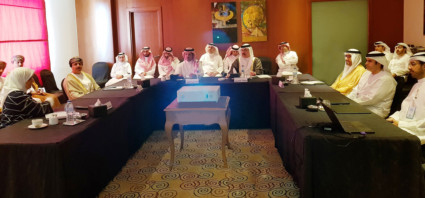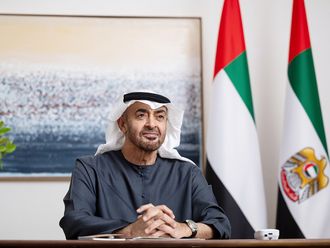Abu Dhabi: Officials from five Gulf Cooperation Council (GCC) member countries have discussed plans for a regional system to manage domestic workers, the UAE Ministry of Human Resources and Emiratisation said on Sunday.
Nasser Bin Thani Al Hameli, Minister of Human Resources and Emiratisation and his counterparts from Bahrain, Saudi Arabia, Oman and Kuwait attended a meeting on the sidelines of a labour conference in Cairo, the ministry said in a statement.
The Gulf officials discussed a common vision to run the file of domestic workers during all stages of the temporary contractual work cycle, it said.
The officials agreed to set up a technical team to submit proposals that could “outline a common Gulf vision in the file of domestic workers”.
These recommendations will be considered in a future meeting, the ministry said.
Last year, the UAE approved a law to protect basic rights of domestic workers, including a regular weekly day off, 30 days of paid annual leave and the right to retain personal documents.
The law also provides for a daily rest of at least 12 hours — including at least eight consecutive hours.
The law promotes decent work conditions for domestic workers, including social protection and access to specialised tribunals at the Ministry of Human Resources and Emiratisation and courts. It sets 18 years as a minimum age for a domestic worker, which is consistent with the international rules on elimination of child labour.
The UAE minister told the meeting the domestic workers constitute an important part of the temporary employment in the Gulf countries, which are keen on protecting the labour rights, through applicable laws and practices across the GCC countries in the light of a number of challenges that require developing coordination among the ministries concerned with running and organising the file of domestic workers and thereby contributing to face such challenges jointly.
“The GCC governments are keen on developing partnership with the governments of the labour-sending countries, particularly through Abu Dhabi Dialogue, out of their shared responsibility to ensure the application of fair and transparent recruitment practices that could address any negative practices, which the workers may suffer from in their homelands before working in the Gulf countries,” the minister added.
The minister voiced confidence for concluding a unified Gulf vision, which is able to deal with the file of domestic workers, in a manner that enhances the national legislation and practices, fulfils the aspirations of employers, and restricts any negative practices that may take place during any stage of the contractual work cycle.
The working conditions of domestic workers in the six-member GCC have come under scrutiny in the wake of the murder of Filipina Joanna Daniela Dimapilis, whose body was found recently inside a freezer in an apartment in Kuwait that had been abandoned by her employers in 2016.
In January, the Philippines banned its workers from being deployed to Kuwait after President Rodrigo Duterte highlighted several instances of abuse.
The Philippines is now negotiating an agreement with Kuwait designed to guarantee its workers certain rights including to retain their cell phones and passports and have proper meals.













